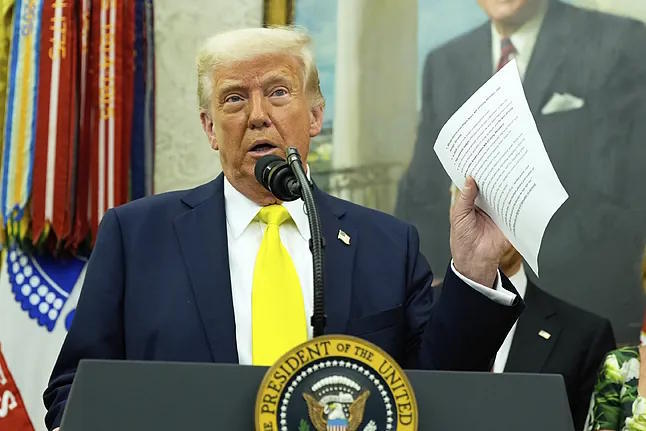It is no secret that Vladimir Putin is furious about the destruction of a significant part of his air fleet after the worst attack since World War II on his bases and the new attack on the Crimean Bridge. He will try to respond, and with force. The U.S. president, who promised to end the war in Ukraine in a day, seems to find it understandable and almost inevitable. Far from trying to avoid it or opting for peace negotiations, Donald Trump assumes that the Russian leader will have to do so, and even considers involving him in nuclear talks with Iran, instead of isolating him.
This is evident from the latest message on his social media from the U.S. president. Trump and Putin spoke on the phone again on Wednesday for an hour and fifteen minutes, the second conversation in two weeks. This comes after their respective Foreign Ministers, Sergey Lavrov and Marco Rubio, did the same. "I just finished speaking on the phone with Russian President Vladimir Putin. The call lasted approximately an hour and fifteen minutes. We discussed the attack on Russian aircraft by Ukraine, as well as other attacks carried out by both sides. It was a good conversation, but not one that leads to immediate peace. President Putin stated, very firmly, that he will have to respond to the recent attack on the airfields," the message begins.
On the Russian side, it has been highlighted that Trump allegedly insisted that he was not aware of the attack on Russian planes, fighters, and bombings. The option of a meeting between Putin and Zelensky "had never been practically considered." And they made it clear that they blame Kiev for trying to sabotage peace talks. In a statement, diplomat Yuri Ushakov announced that U.S. Special Envoy Steve Witkoff has already arrived in Moscow to discuss not only the Ukrainian conflict but also bilateral relations between Russia and the United States. This is what truly interests a Kremlin in need of international support. In fact, Ushakov indicated that the White House had asked the Kremlin to join the nuclear talks with Tehran.
On May 26, Trump seemed to have finally lost patience with Putin, stating that he had always had a very good relationship with him, but that "something has happened. He has gone completely MAD! He is unnecessarily killing a lot of people, and I'm not just talking about soldiers. They are firing missiles and drones at cities in Ukraine for no reason. I have always said that he wants ALL of Ukraine, not just a part, and maybe he is right, but if he does, it will bring about the fall of Russia!" But what Ukrainians and analysts have pointed out is that the president has been excusing any action or reaction from Putin for months (actually, for two decades). Every two weeks, he gives him two weeks to change his attitude or stop the war, and nothing ever happens. And the facts have proven them right.
There are no longer any criticisms of the Russian president in the message, no references to his escalation, his responsibility, the deaths of people, or the missiles. On the contrary, there seems to be a certain understanding that he "will have to respond" to the coordinated Ukrainian attack, as he "stated very firmly." And an outstretched hand to address other international issues. "We also talked about Iran and the fact that time is running out for Iran's decision on nuclear weapons, which must be made urgently. I told President Putin that Iran cannot have a nuclear weapon, and in this, I believe we agree. The president suggested that he will participate in talks with Iran and that, perhaps, it could be useful in reaching a quick conclusion," Trump wrote in a message that he later deleted.
Since the invasion, Trump and his family, along with a close circle of friends and advisors, have disregarded Ukrainian resistance. The president seems almost offended by the fact that Volodymyr Zelensky and the Ukrainian people have not surrendered, insisting that they "do not have the cards" to win. Trump's children have often said that it made no sense to support Ukraine and challenge a nuclear power, even suggesting that Washington should have armed Russia to quickly solve the problem. In their worldview, there is a mix of disinterest, fear of a nuclear escalation, but also a particular view of international relations, a highly distorted realism in which they see it as normal for Russia to do as it pleases in its "zone of interest," even blaming NATO for the current situation.
But even when Ukraine surprises and demonstrates with that drone attack that it does have some cards, he does not seem very impressed. This week, he simply told reporters that he had not been informed by Kiev of the attacks, without delving into the matter. Trump has spoken with more European leaders. The Finnish president, who has achieved a striking level of access, probably due to being a very good golfer, explained that today, Wednesday, he called both the American and Zelensky, requesting "harsher sanctions from both the U.S. Congress and the European Union to pressure Russia," thanking Senators Lindsey Graham and Richard Blumenthal, who are touring Europe.
